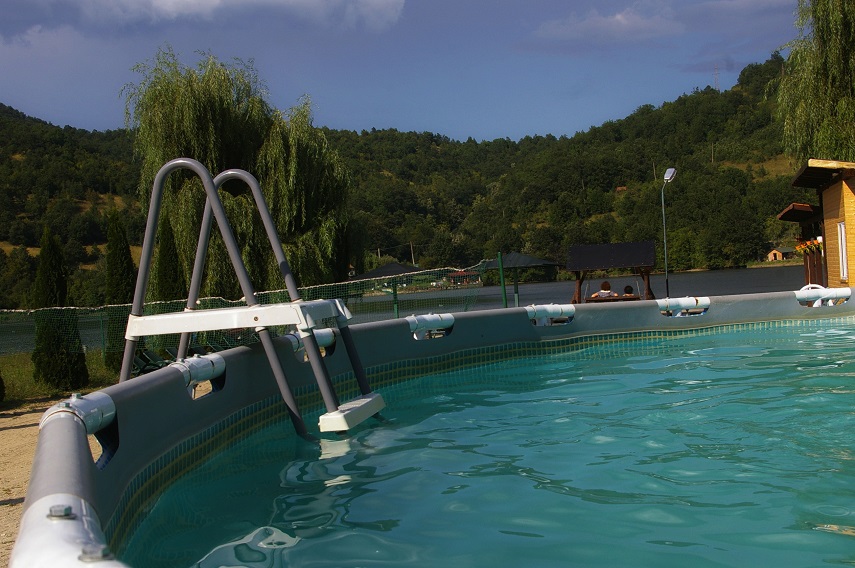Above-ground pools are the most popular type of swimming pool in the United States. They are typically constructed with a concrete or fiberglass shell built on top of an above-grade foundation. This means that they can be placed anywhere, including on your property and lawn.
The main advantage of this type of pool is its ease of construction. You don’t have to dig down into the earth as you do for a traditional in-ground pool. Instead, you build it up from the surface.
The downside to above-ground pools is that they require more maintenance than other pools. In addition, they tend to be less durable because they aren’t below ground.
If you want a pool that requires little upkeep, then an above-ground one may not be right.
However, if you want something that will save you lots of money upfront and will last 10-20 years without replacement, an above-water pool may be just what you need.
4 Major Types of Above Ground Pools
There are four major types of above-ground pools available today. Each one has different features and benefits. Here’s a brief description of each type so you know which one might be best for you.
Inflatable Above Ground Pool
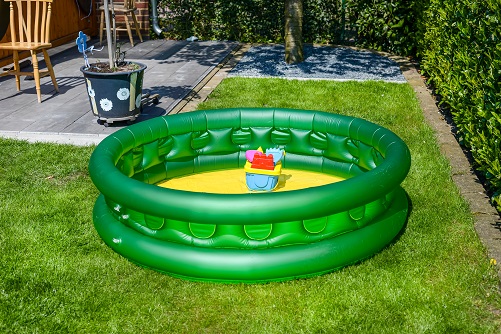
This type of pool is made out of rubberized canvas or rubber and PVC tubing.
It inflates like a balloon when water is added. The tubes are connected by valves at both ends. These allow you to fill the pool with water quickly and easily. Once filled, you simply let the air out of the tube until it reaches the desired size.
Advantages of Inflatable Pools
Because they require no construction, no structures, and no holes, an inflatable pool
Also, due to their small size, you will save a lot of money on your monthly utility bill.
Finally, because it doesn’t take up much space, it won’t use up valuable yard space. And you can move it around as needed.
Disadvantages of Inflatable Pools
As mentioned earlier, inflatable pools are prone to leaks. Also, they can be squeaky and noisy.
In addition, they are limited in their size. Typically, most inflatable pools are limited to 15 feet in width and 4 feet in water depth.
Steel Frame Above Ground Pool
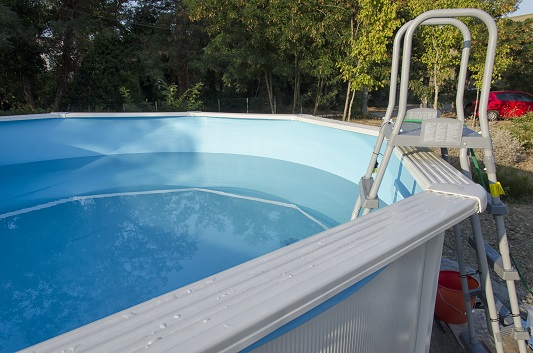
Steel frame above ground pools consist of a steel frame covered with a vinyl liner.
Unlike some of the other types of an above-ground pool, they are usually built directly on grade. This means that they sit directly on the ground.
Advantages
Steel-frame above ground pools are easy to install.
Since they are built directly on the ground, they are also easier to clean and easier to repair water plumbing and attachments.
Disadvantages
Because they are built directly on grade with the external poolside surface exposed, they are susceptible to damage from heavy winds and storms. Inground pools are almost completely protected from the elements.
Permanent Above Ground Pool
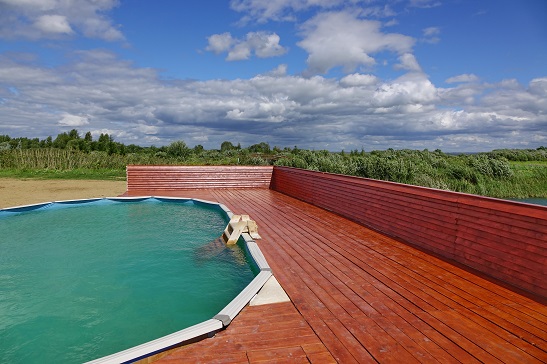
These are the most common type of above-ground pools. They are made of a fiberglass or concrete shell that sits on a poured concrete base.
The shell is attached to the base using rebar. These pools are meant to be installed once and enjoyed forever.
Advantages
Permanent above-ground pools come in far more design choices and larger sizes than the other types of pools discussed except for semi-inground pools.
In addition, if you want to install a pool deck you’ll basically have to go this route.
Disadvantages
Permanently installed above-ground pools are significantly more expensive for the same volume of water than a steel-structure pool.
They are almost a bit more difficult to repair due to the more expensive shell.
Semi-inground Above Ground Pool
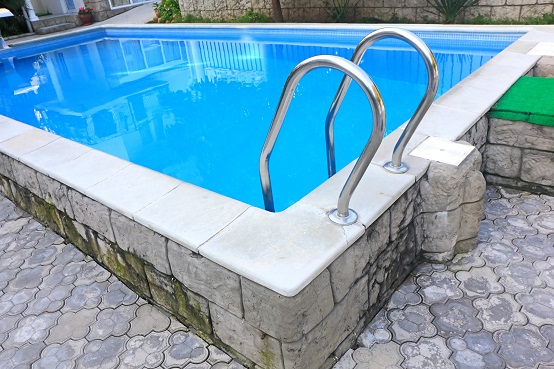
A semi-inground pool is similar to an above-ground pool except that it is partially buried. Like an above-ground pool that sits on grade, a semi-inground one sits on grade.
But unlike an above-ground pool with a concrete or fiberglass shell, a semi-inground pools can also use a plastic liner instead because much of the water pressure is contained by the surrounding earth.
Advantages
Unlike an above-ground pool without a liner, a semi-inground one can be easier to maintain and last longer. This is because the earth supports much of the structure, leaving less work for the liner.
Disadvantages
Unlike an above-ground pool whose shell is attached to a concrete slab, a semi-inground pool requires professional work to properly dig and fill the hole.
In addition, many semi-inground pools require water drain plumbing underground. This increases its cost considerably.
Above Ground Pool Installation
To get the most value out of your investment, make sure you choose a reputable installer.
Before hiring anyone, ask friends and neighbors if they recommend a particular company. Look for signs of professionalism such as a clearly marked office address, phone number, license number, and insurance information.
When choosing a contractor, look for companies that offer warranties on their workmanship. Ask about how long they have been in business and what kind of experience they have.
Finally, ask for references so you can check their work history.
Above-Ground Pool Buying Guide

If you’re interested in purchasing an above-ground pool, it’s essential to consider some things before making your final decision.
1. How Much Maintenance Will I Need To Do?
If you plan to use your pool every day, you’ll probably want to choose a larger pool. On the other hand, a smaller pool will require less maintenance because it will not hold as much water.
2. What Size Is Right For My Family?
The size of your family will determine what kind of pool you should buy. For example, if you have small children, you may want to go with a smaller pool. This way, you can watch them while they play in the pool.
3. Where Will I Put It?
If you live on a completely flat lot, your choices are unconstrained. But if you want to place your pool on a sloped part of your lot, you will likely need to purchase a permanent or semi-inground pool.
4. What Kind Of Features Does The Pool Have?
Some pools include spas, slides, hot tubs, and even in-water fire pits. These additional features can add value to your home, but they require additional plumbing, electrical work and construction.
5. How Much Money Am I Ready To Spend?
Depending on how big you want it to be, you may decide to spend $10,000-$20,000 on a pool. Don’t forget about the price of accessories like fences, lighting, and landscaping. And if you need a foundation or a hole, add another $5,000-$10,000 for the work.
6. What Type Of Warranty Does Your Pool Come With?
You should always ask for a warranty when buying a pool. Most warranties last at least a few years and cover everything except the liner itself.
Other Considerations
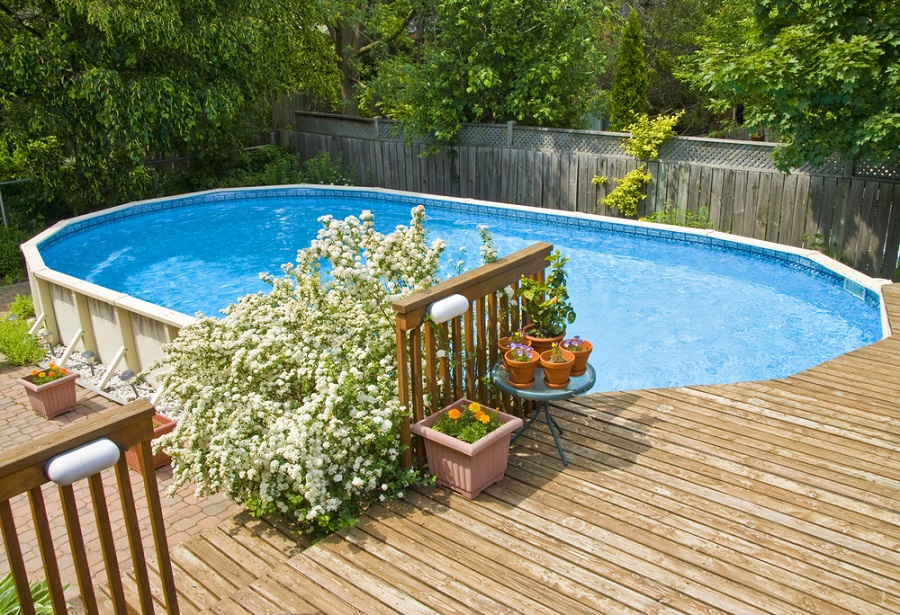
When choosing an above-ground pool, there are many other factors you may want to consider. Here we discuss the most important ones.
Safety
Safety is one of the most important aspects of owning an above-ground pool. Many safety features need to be considered. Do you need a pool deck that can be locked to prevent pets and children out?
Water Quality
Water quality is another crucial aspect of owning an above-ground pool. Make sure that the pool is adequately filtered and chlorinated. And if you are going to place it near trees, you’ll need to clean it more frequently.
Location
Location is another important aspect of choosing an above-ground swimming pool. You should ensure that the location where you intend to install the pool is free from trees, power lines, and any other obstructions.
Design
Design is yet another essential aspect of choosing the best type of above-ground pool. You should ensure the pool’s design matches the style of your house.
In addition, simpler shapes cost a LOT less than complex/creative ones. Adding steps and varying depth will also cost more.
Ease of Installation
Ease of installation is yet another essential aspect to consider when choosing the right type of above-ground swimming pool for you.
If you just want to swim now with a minimum of hassle, then choose an inflatable backyard pool. If you want something larger, then go for the steel structure pool.
Price
Price is yet another essential aspect when choosing the best type of swimming pool for you. You should ensure that you get the best deal possible. Most above ground pools cost $10,000 to $50,000.
Home Value
The potential impact on your home’s value is yet another essential aspect that you should consider when choosing the perfect type of swimming pool for yourself.
In general, above-ground pools detract from the value of your home if they are permanently installed or semi-submerged in the ground.
On the other hand, inflatable and structural steel above-ground pools can be removed easily, so they typically do not.
Benefits of Above Ground Pools

1. Easy to Install
Above-ground pools are easy to install. First, you dig out a hole for the pool and pour the concrete. After that, you need to fill up the pool with water.
2. Fun in the Sun - And a Break for Mom and Dad
Above-ground pools provide great benefits to homeowners. For example, they allow you to enjoy summer all year long. For parents, above-ground pools are a great way to give your kids a healthy option during summer breaks – you can use them as a party area, a playroom, a place for kids to swim, etc.
3. Less Expensive to Run
Above-ground pools are smaller than traditional in-ground pools, so you will spend considerably less on utilities and chemicals for the same amount of fun.
4. Keep Your Kids Safe
Because they are usually no more than 5 feet in depth, most above-ground pools are safer for families with children than deeper inground pools.
5. Saves Space
Above-ground pools save space. Since they don’t require a lot of land, you can easily build one and still keep most of your yard.
6. Affordable
How To Maintain Above Ground Pools
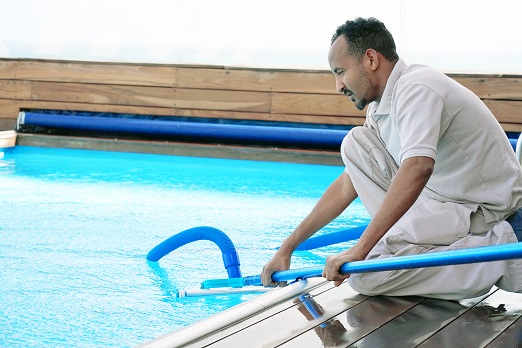
Maintaining an above-ground pool is easier than maintaining a regular pool. All you need to do is clean the pool once or twice per week.
You can hire someone to clean the pool for you. But this option isn’t recommended since you may not know how to properly maintain an above-ground pool
You can clean the pool by yourself using a hose. Make sure that you remove all debris from the pool first. Then, wash down the sides of the pool. Finally, rinse off the bottom of the pool.
If you have a small pool, you can use chlorine tablets to disinfect the pool. These tablets kill bacteria and other harmful organisms.
Finally, consider purchasing an automatic pool cleaner and/or surface skimmer to help prevent accumulation of organic debris. This will help keep your water cleaner longer and reduce the frequency of adding chlorine, et al.
FAQs
Q: How big should my above-ground pool be?
A: There isn’t a specific size limit for above-ground pools. However, there are certain factors that you should take into account when deciding on the size of your pool. These factors include:
Your budget.
How large your backyard is.
What kind of features do you want in your pool.
Q: What are the different types of above-ground pools available today?
A: Today, there are four major types of above-ground swimming pools. These include:
Freestanding pools.
In-ground pools.
Modular pools.
Pool kits.
Q: Are above-ground pools safe?
A: Yes, above-ground pools are safe due to US regulations. They are built to withstand heavy winds and strong storms. Also, they are designed to help prevent drowning accidents.
Q: Can I use an above-ground pool with a kiddie pool?
A: Yes. You can combine an above-ground pool and a kiddie pool together. This will give you two separate areas where you can enjoy both activities at the same time.
Q: Do above-ground pools require special care?
A: Yes. Above-ground pools require special attention. You will need to inspect your structure and shell for potential damage, for example.
Q: Is an above-ground pool easy to clean?
A: If properly equipped with a pool filter, automatic pool cleaner, and automatic skimmer your above-ground pool will stay clean all year long.
Q: How often should I clean my above-ground pool?
A: Cleaning your above-ground pool depends on its size. Smaller pools usually require cleaning once or twice per week while larger pools need cleaning once or twice per month.
Final Thoughts
Above-ground pools are very popular with younger families for their low cost, ease of installation, and shallower depth.
That said, you should always purchase a high-quality above-ground pool from a reputable and proven brand instead of a cheaper one.
Hopefully this article will help you decide on the best type of above-ground pool for you.

